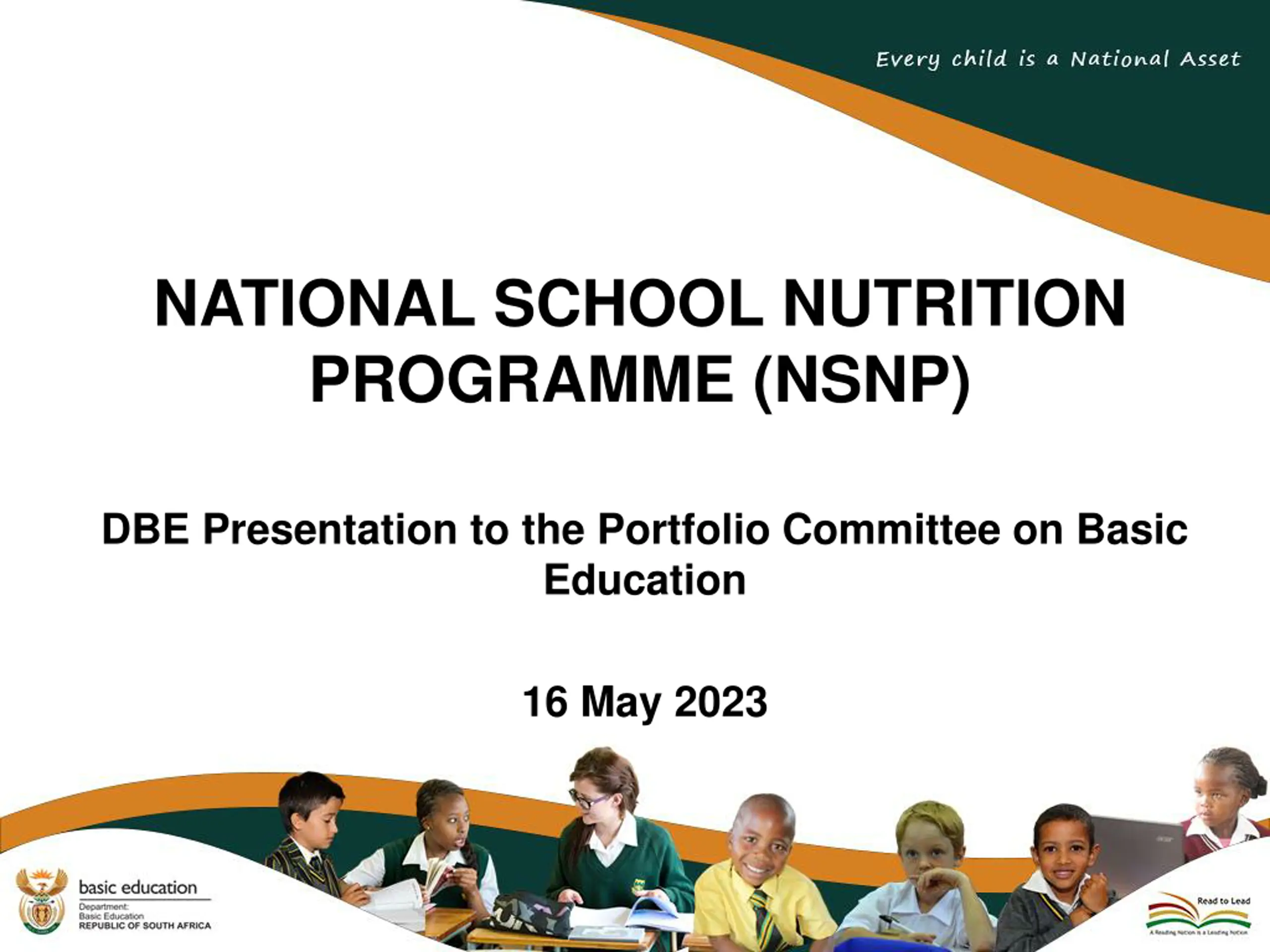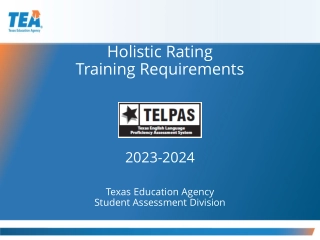Enhancing Learning through NSNP: A Holistic Approach
The National School Nutrition Programme (NSNP) aims to combat hunger and malnutrition in learners, evolving from cold to warm meals. The programme targets schools based on resources, providing nutritious meals with specific guidelines to enhance learning capacity. Implementation includes quarterly reports, financial management, and partnerships for sustainable success.
Download Presentation

Please find below an Image/Link to download the presentation.
The content on the website is provided AS IS for your information and personal use only. It may not be sold, licensed, or shared on other websites without obtaining consent from the author.If you encounter any issues during the download, it is possible that the publisher has removed the file from their server.
You are allowed to download the files provided on this website for personal or commercial use, subject to the condition that they are used lawfully. All files are the property of their respective owners.
The content on the website is provided AS IS for your information and personal use only. It may not be sold, licensed, or shared on other websites without obtaining consent from the author.
E N D
Presentation Transcript
NATIONAL SCHOOL NUTRITION PROGRAMME (NSNP) DBE Presentation to the Portfolio Committee on Basic Education 16 May 2023
BACKGROUND OF THE NSNP NSNP is a key poverty alleviation programme of government to address hunger, malnutrition and micronutrient deficiencies in learners A key pillar of the Care and Support for Teaching and Learning Framework that seeks to address barriers to teaching and learning NSNP key objective is to enhance learning capacity and give access to education. In 2002 the programme transferred from Department of Health to Department of (Basic) Education (only primary schools) Between 2009 2011 the Inclusion of Secondary Schools following recommendation by the Financial and Fiscal Commission Since inception, NSNP Menu has evolved from serving a cold meal (bread and vitamin C enriched drink) to a warm cooked meal (variety in protein, starch, vegetable/fruit) 2
NSNP CONDITIONAL GRANT FRAMEWORK Targeting Q 1-3 schools Special schools Identified Q 4&5 (According to available resources) Aim to provide meals to all learners in: Budget Distribution: 5% increase for primary schools Meal cost per learner 3% increase for secondary Feeding Minimum (97%) Min R1640 honorarium for VFHs Far-flung farm and rural schools: higher cost (incl transport cost) 3
NSNP CONDITIONAL GRANT FRAMEWORK Green, yellow & red fresh vegetables/fruits served daily. A variety of protein-rich foods served in line with approved menu options. Soya mince meeting approved specifications served only once a week. Canned pilchards/mackerel/sardines served at least once a week. Seasoning should be provided for all meals. UHT full cream milk or pasteurised maas served once a week. requirements Feeding Responsibilities Implementation of NSNP Development and implementation of business plans Provide human resource capacity at all relevant levels Quarterly reports Transfer schedules + Reconcile expenditure by schools (EC, FS, NC, NW) of provinces Payment Provinces that transfer funds to schools: 06 April 2023, 14 June 2023, 07 September 2023, 08 November 2023, 07 December 2023 Provinces that procure via tender: 06 April 2023, 20 July 2023, 12 October 2023, 08 November 2023 and 23 January 2024 schedule 4
NSNP IMPLEMENTATION SUPPORT BY DBE Research, policy review, development of guidelines Improvement Plan Smallholder farmers Breakfast concept UIF Advocacy - Inter-sectoral forums - Education in various media platforms - National and Provincial Awards Food Safety - Facilities assessment - Improve practices towards compliance - Training Capacity Building - Meal planning - Financial management - School gardens - - - - Facilitate Partnerships Private and public sector, NGOs. 5
OVERVIEW OF THE NSNP The programme provides nutritious meals to 9.6 million learners on school days - A nutritious meal is made up of: quality of food items used, proper preparation and cooking methods and quantities served Funded through a Conditional Grant FY2023/24 budget = R9.8 billion. Additional budget over the 2023-2025 Medium Term Expenditure Framework (MTEF) of R1.5 billion to mitigate increased food inflation, spikes in petrol prices, high learner numbers and improved menu options. Also to extend the provision of breakfast. According to the NSNP Conditional Grant Framework: DBE has a key responsibility for oversight of compliance with National Treasury Regulations including the NSNP Conditional Grant Framework as funds are disbursed to Provincial Education Departments to procure goods and services to implement the NSNP. Monitoring and support as a key responsibility at provincial and district levels. 6
NSNP DASHBOARD EC* FS* GP KZN LP MP NC* NW* WC Total Number of schools reached 5728 790 1074 5446 3636 1620 483 1354 1025 21 156 Number of learners reached 1,626 m 585,100 1,150 m 2,351 m 1,660 m 920,110 210,222 677,,078 509,713 9,689 m Number of VFHs 12583 3395 5592 14675 10640 5287 1660 4535 2947 61 314 2023/24 Budget- Rs 1,647 b 535 m 1,094 b 2,089 b 1,665 b 886 m 244 m 621m 497m 8,279 b Awarding of contracts Schools procure via annual district contracts Schools procure Schools procure 01 Jul 2020 07 Oct 2017 01 Jan 2023 Schools procure via short- term contracts Date of award Not yet submitted Not yet submitted 3 yrs renew- ed Schools procure Schools procure Contract duration 3 yrs 3 * Notes: Provinces that transfer funds directly to schools for procurement of food. EC and NW schools have separate bank accounts. 7
CURRENT NSNP PROCUREMENT MODELS 8 Source: FUEL
NSNP MENU Menu specifications as per Grant Framework in line with the SA Based Dietary Guidelines of NDoH; Benchmarked at 25 30% per meal of the children s recommended daily allowance(RDA) Specifies daily intake of protein, starch, fruit and veg Menu Committee (incl PEDs) annual reviews for costing and to improve the quality 9
THE NSNP EVALUATION In 2016, an Implementation Evaluation of the NSNP was jointly Department of Planning, Evaluation (DPME) undertaken with the and Monitoring Recommendations to improve menu: To improve energy uptake: develop a model for providing breakfast at the start of the school day - Improve the protein and include a variety for a 5 day menu cycle alternatives served 10
DIVERSIFYING PROTEIN PROVISION: BACKGROUND NSNP old menu constitutes protein variety (soya, beans, canned pilchards, UHT milk / maas) repeat of pilchards or sugar beans to complete 5 day cycle Processed chicken livers approached National Regulator for Compulsory Specifications (NRCS) for a database of canneries, approval of new product It is nutrient dense (high in Iron, Zinc, Vitamin A as well as High Biological Value Protein); with food safety consideration 11
PROCESSED CHICKEN LIVER: HOW IT STARTED 2018/19 PILOT PROTEIN IMPROVEMENT PROJECT 2016/17 NSNP EVALUATION 2017/18 DTIC Website used to source canneries RECOMMENDATI ONS Menu improvement Researched on: 1. Nutrient density Soya manufacturers meeting Protein alternative 2. Cost Product development Increase energy uptake 3. Shelf life Budget tested 4. Effect of heat WC and GP piloted the canned chicken livers 12
CHICKEN LIVER PROJECT IN PEDs Developed with manufacturers processed chicken livers to provide good quality protein with Vitamin A and Iron Currently three manufacturers engaged jointly with NRCS GP and WC piloted and rolled out chicken liver (2018/19) PEDs phasing-in approach in targeted districts/schools 13
PROCESSED CHICKEN LIVERS PEDs PHASED-IN APPROACH DURING FY2023/24 All provinces phasing in processed chicken livers; PEDs FY23/24 roll-out: GP, FS and WC = in all schools EC, KZN, LP, MP and NW = selected schools and districts NC = all secondary schools 14
SCHOOL BREAKFAST Research evidence is clear - breakfast has positive effects on immediate cognitive well-being. It is effective in supporting learner well-being, promotes punctuality and attendance. Tiger Brands Foundation (TBF) Evaluation study of the NSNP and TBF in-school breakfast programme in Eastern Cape (2015) suggests, lunch and breakfast combined provide nutrients to protect the most vulnerable children from undernutrition Breakfast menu: fortified cooked porridge, sorghum maize Collaborations with private sector on breakfast provision FY2023/24 state of readiness of PEDs for breakfast roll-out 15
PEDs FY2023/24 ROLL-OUT & STATE OF READINESS/PHASED APPROACH SCHOOLS PED 4 052 Primary School/Combined Schools EASTERN CAPE ALL GAUTENG ALL FREE STATE All Primary Schools KWAZULU NATAL 2 314 Primary Schools LIMPOPO 93 Primary Schools + 47 Secondary Schools MPUMALANGA 300 schools NORTH WEST 90 103 learners in Primary Schools + 47 555 learners in Secondary Schools ALL NORTHERN CAPE WESTERN CAPE 16
PARTNERSHIPS Long-standing partnerships serving breakfast and complements the NSNP meal; To date the Department has entered into formal partnerships with the following for in-school breakfast programmes Kellogg's SA PepsiCo/Pioneer Foods Tiger Brands Foundation Nestle Siqalo 17
FOOD SAFETY IN NSNP A key priority as the sector adopts zero tolerance on food contamination and poisoning in schools; To mitigate - collaboration with DoH in district based food safety teams DBE continues to support PEDs through facilitation of annual Food Safety Workshops aimed at: continuously raising awareness and promoting proper food handling practices e.g. storing food on pallets accredited food safety and hygiene training kitchen compliance with food safety regulations 18
WAREHOUSE MONITORING Warehouses linked to NSNP in provinces are monitored to ensure compliance to health regulations on food safety NSNP through provincial and district food safety teams collaborates with local Environmental Health Practitioners (EHPs) to monitor and certify warehouses for compliance municipalities and their Ongoing training to service providers on safe and hygienic warehouse management 19
WAREHOUSE MONITORING Protective clothing Sterile clean factory Hand washing area Lab for quality assurance Sensory evaluation 20
Monitoring, Response and Reporting (MRR) Aims to: Collect the right information (Monitor) Analyse, understand and share this information in the right way (Report) Use this information to improve performance (Respond) Key Performance Indicator (KPI) > nutritious meals served on time Nutritious meals (variety/3 food groups) Serving portions Health and safety Record keeping 22
NSNP IMPLEMENTATION INEFFICIENCIES- PRESSURES ON THE MEAL COST The communities. Covid unemployment and food insecurity increased the demand for food and school nutrition meals across all nine provinces Pressure to include additional indigent learners in Q4-5 Additional pressure to include ECD Steep food inflation that outstrips consumer price inflation (CPI) Lack of an integrated logistics management system increasing the cost of food deliveries. Further aggravated by recent escalation in the cost of fuel No benefits from economies of scale Procurement from retailers, not manufacturers Pilfering and corruption in the process due to poor stock control and management impact of COVID-19 pandemic has exacerbated hunger in 24
NSNP IMPLEMENTATION INEFFICIENCES: QUALITY CONTROL Quality: Poor quality protein food items Non-nutritious food items Additives to be thrown away Sub-standard soya mince cooked with additives Quantities: Under delivery of protein food items Short delivery of fresh fruit or vegetables Poor quality food delivered No batch management 25
MODERNISATION OF THE NSNP Develop a new model to take advantage of economies of scale Modern Stock Management System - right quantity, quality Better Quality Assurance Better compliance to food quality standards Modern Integrated Logistics System - high quality inputs (fruit & veg) on regular basis; efficient warehouse and delivery system Extensive Local Economic Empowerment - focus on women, youth and people with disability Introduction of home grown school feeding - direct link with smallholder farmers 26
CONCLUSION A flagship poverty alleviation programme of government School meals provide a critical safety net for vulnerable children and households The DBE is committed to improve the quality of the meals we provide, as well as extending the reach of the programme. 27























